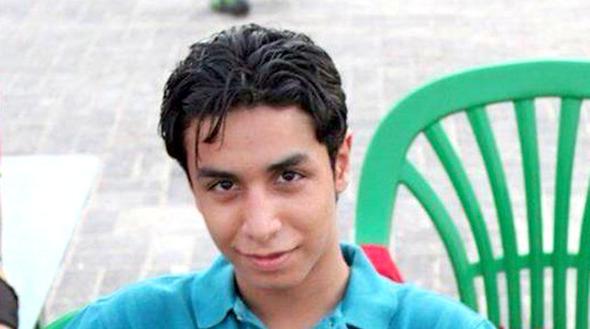Speechless: Saudi Arabia sentences Ali al-Nimr, an Arab spring protester, to be crucified. http://humanrightsfoundation.org/news/hrf-to-saudi-arabia-halt-beheading-and-crucifixion-of-21-year-old-activist-ali-mohammed-al-nimr-00472 …
The potential execution of Ali Mohammed al-Nimr, a Saudi protester arrested at 17 for his involvement in the Arab Spring, has been condemned far and wide.
Amnesty International, U.N. human rights experts, British Prime Minister David Cameron and even American talk show host Bill Maher have demanded a stay of execution to no avail.
If you haven't used up all your heroism on the clock kid, try hashtagging #AliMohammedAlNimr http://www.whosay.com/l/pWab2Ga
Knowing that her son could be beheaded and crucified at any moment, Nimr's mother, Nusra al-Ahmed, is pleading for help from the only person on Earth she thinks may have the power to save her son's life: President Obama.
“He is the head of this world and he can, he can interfere and rescue my son. … To rescue someone from harm, there is nothing greater than that," she told the Guardian in her fist interview with foreign media. "I mean my son and I are simple people and we don’t carry any significance in this world but despite that, if he [Obama] carried out this act, I feel it would raise his esteem in the eyes of the world. He would be rescuing us from a great tragedy.”
Nimr was arrested in 2012, while still a high school student, after he participated in Arab Spring-inspired demonstrations demanding reforms in the eastern province of Qatif, a region with a history of bloody uprisings,according to CNN.
As protests intensified after his arrest, so, too, did the charges prosecutors filed against Nimr. In addition to accusations of “breaking allegiance with the ruler,” “going out to a number of marches, demonstrations, and gatherings against the state and repeating some chants against the state,” and using his cellphone to incite demonstrations, he was now also accused of sheltering fugitives and attacking police with molotov cocktails and rocks, according to CNN.
He can be executed at any time.
“For other people every hour is composed of 60 minutes, but for me every hour is 60 beats of pain,” his mother said.
Nimr's parents portrayed their son not as a violent provocateur but as a typical teenager who loved photography, soccer and traveling and enjoyed dressing stylishly in Western attire.
“He was a good student with high grades right from the start,” Mohammed al-Nimr told The Washington Post about his incarcerated son in an interview last week.
“His personality has a bit of stubbornness, independence and rebelliousness,” his father added.
In her interview with the Guardian, Nimr's mother condemned the nature of her son's punishment, calling his sentence antiquated and "savage." That sentence, according to the paper, would include Nimr being beheaded and then having his lifeless body displayed in public.
“I feel that one’s very being is repelled at such a ruling. … It’s backwards in the extreme," Ahmed told the Guardian. "No sane and normal human being would rule against a child of 17 years old using such a sentence. And why? He didn’t shed any blood, he didn’t steal any property.
“Where did they get it [this sentence]? From the dark ages?”
So far this year, Saudi Arabia has executed at least 134 people, which is already 44 above last year's total, according to the United Nations Office of the High Commissioner for Human Rights. In a statement released last month, the office called the kingdom "a sad exception" in a world that continues to shy away from the death penalty. The statement pointed out that the country is party to the U.N. Convention on the Rights of the Child.
“Any judgment imposing the death penalty upon persons who were children at the time of the offence, and their execution, are incompatible with Saudi Arabia’s international obligations,” the statement said.
Ali Adubisi, director of the Berlin-based European Saudi Organisation for Human Rights, told the Guardian in May that the majority of the executions stem from drug and murder convictions. Activists have struggled to explain the rising numbers, but Adubisi said poverty could be responsible for an increase in drug crimes.
Last week, the Saudi ambassador to the U.N., Abdallah al-Mouallimi, declined to discuss the case during an interview with BBC's "Newsnight" but noted that the “legal process has not been exhausted”
“We respectfully request the world to respect our systems and our judicial processes, and our laws and regulations, and not to interfere in the internal affairs of a sovereign state,” he said.
Asked why the British government — whose members have urged Saudi Arabia not to follow through with Nimr's execution — backed the kingdom's bid to join the United Nation's Human Rights Council during an interview with Channel 4 News last week, Cameron resisted the question before finally providing a coldly pragmatic answer.
"We have a relationship with Saudi Arabia and if you want to know why, I'll tell you why. It's because we receive from them important intelligence and security information that keep us safe."
Ahmed told the Guardian she appreciates the support for her son pouring in from countries all over the world. Even if she receives support from Obama, she told the Guardian she realizes her son's fate ultimately falls to King Salman bin Abdulaziz Al Saud.
“I wish that King Salman would lift this pain from my son. … The king is also a father, and he should be the first one to feel sympathy for us,” she said.





No comments:
Post a Comment